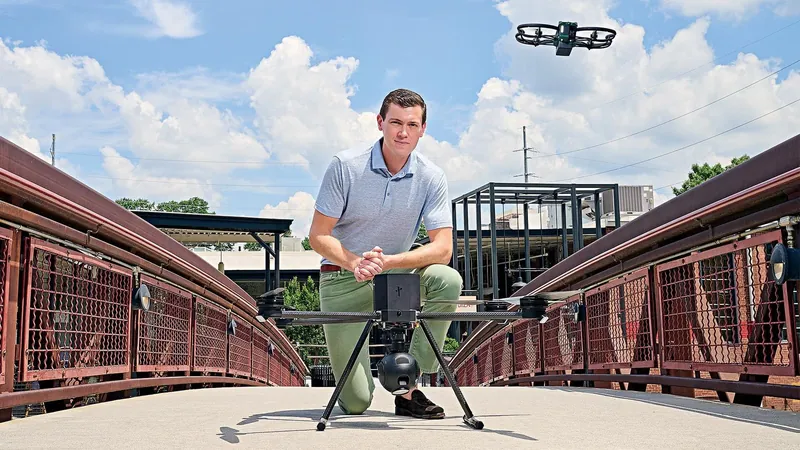
Revolutionizing Crime Prevention: Flock's Bold Vision for a Safer America
2025-09-03
Author: Jia
Imagine a world where crime is nearly nonexistent, thanks to cutting-edge technology. Flock Safety, a trailblazing AI startup, believes that this vision is within reach, aiming to eliminate crime in the U.S. with its expansive network of AI-powered surveillance cameras.
With over 80,000 cameras monitoring streets, highways, and parking lots, Flock has emerged as a $7.5 billion market leader, attracting attention from major players in the tech industry. CEO Garrett Langley is determined to not just compete, but to revolutionize law enforcement alongside technology giants like Axon and DJI.
In a fascinating glimpse behind the scenes, Lieutenant Tim Fecht at the Dunwoody Police Department activates a DJI drone, quickly shifting its focus onto a local mall where a suspected shoplifter has been spotted. The drone streams live footage back to command center screens packed with crime data, license plate readings, and live alerts.
But Flock’s influence doesn't stop at the ground. Soon, their cameras will take to the skies on homegrown drones, manufactured in a state-of-the-art facility, marking a significant push against global competitors like DJI.
Langley boldly states his ambitious forecast: in less than a decade, his cameras will significantly reduce crime rates nationwide. He envisions a society where physical safety and civil liberties coexist harmoniously.
However, not all is smooth sailing. Critics from the privacy advocacy community argue that Flock's surveillance strategy poses serious risks to civil liberties, claiming it threatens to usher in a dystopian future where citizens are constantly watched. Activist groups have sprung up in response, passionately advocating for accountability and transparency.
Despite the opposition, Langley remains undeterred. While sure-footed success stories from municipalities highlight Flock’s efficacy—like catching a gang involved in ATM thefts—challenges persist. Last-minute operations or inadequate police identification can sometimes hinder immediate results.
Flock’s rapid expansion is powered by a diverse clientele that includes 5,000 law enforcement agencies and numerous corporate giants like FedEx and Lowe's, leading to revenue growth of 70% in just one year.
Yet, controversy follows. Legal challenges loom over Flock’s practices, including concerns about the potential misuse of data, especially regarding sensitive issues like immigration and abortion law monitoring.
The company faces fierce competition from Axon, which recently launched its own line of surveillance cameras at a lower price point. Langley, however, vows to outpace his competitor with superior products.
Flock's innovations don't stop with crime monitoring; they aim to leverage their data for public services like traffic management and urban planning, envisioning a smarter, safer future.
As Flock gears up for the launch of its drones and new technologies, Langley and his team remain steadfast in their mission. In a world where safety intersects with privacy, the conversation around surveillance technology has never been more critical.
This dynamic intersection of crime-fighting technology and civil liberties invites deeper scrutiny and engagement as we careen forward into an unpredictable future.

 Brasil (PT)
Brasil (PT)
 Canada (EN)
Canada (EN)
 Chile (ES)
Chile (ES)
 Česko (CS)
Česko (CS)
 대한민국 (KO)
대한민국 (KO)
 España (ES)
España (ES)
 France (FR)
France (FR)
 Hong Kong (EN)
Hong Kong (EN)
 Italia (IT)
Italia (IT)
 日本 (JA)
日本 (JA)
 Magyarország (HU)
Magyarország (HU)
 Norge (NO)
Norge (NO)
 Polska (PL)
Polska (PL)
 Schweiz (DE)
Schweiz (DE)
 Singapore (EN)
Singapore (EN)
 Sverige (SV)
Sverige (SV)
 Suomi (FI)
Suomi (FI)
 Türkiye (TR)
Türkiye (TR)
 الإمارات العربية المتحدة (AR)
الإمارات العربية المتحدة (AR)